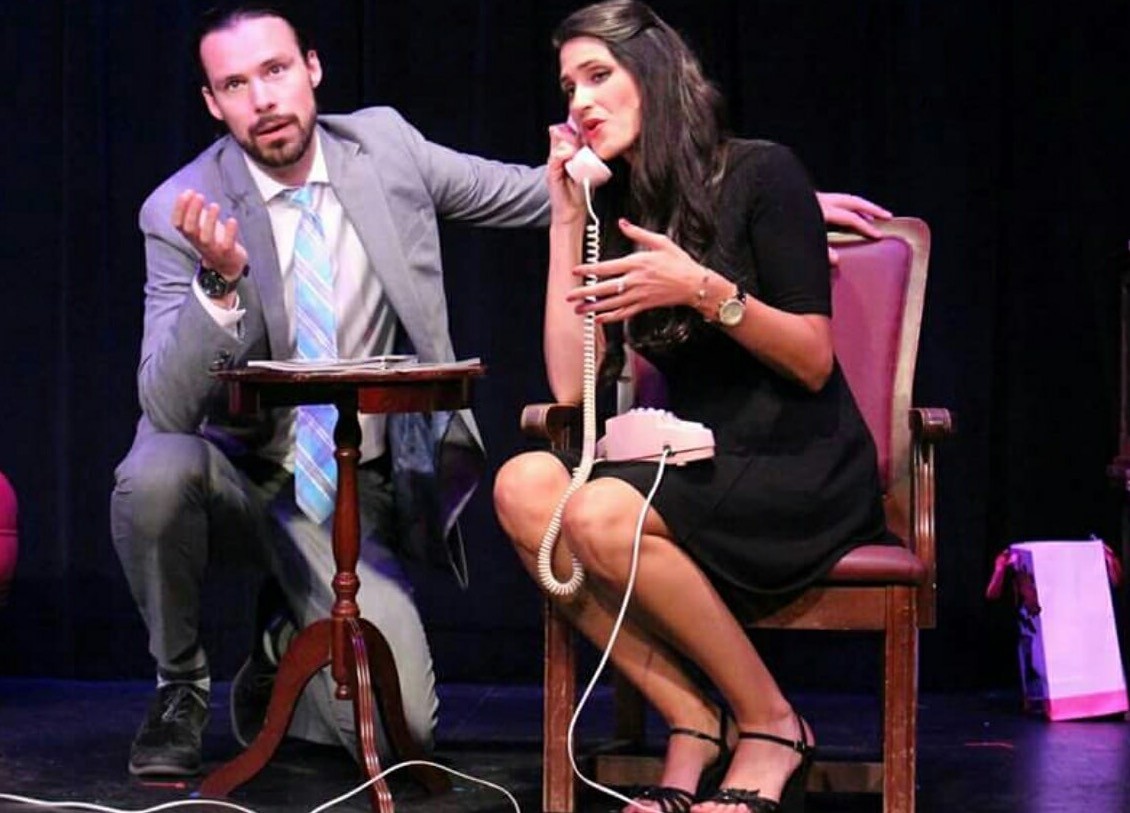Friday and Saturday nights at the Square Room on Market Square, Marble City Opera presented two short works: Gian Carlo Menotti’s “The Telephone” and Francis Poulenc’s “La Voix Humaine,” which translates into English as “The Human Voice.”
On the surface, staging operas the way MCO does them may seem like a cheap alternative to fully developed staging with a set of backdrops, furnishings and props, along with a small chamber orchestra to accompany the performance. All of that is intended to be a complete world designed to bring an audience into it.
But there’s another, more meaningful perspective. The blank box, in this case the natural characteristic of the Square Room, in this weekend’s productions, treated the audience as an intellectual partner in realizing the story. It’s much the same way an author asks the reader of his novel to fill in imagined details that would bog down the telling if the author created everything himself and the reader had to wade through them to get the mental picture.
There were objects on stage in both pieces, a few furnishings and the all-important telephone, different ones in each piece. In the Menotti, written in 1945, it was a pink princess phone (actually not introduced by Bell Telephone until 1959), and an older, more decorative French-looking telephone in the Poulenc, written 15 years later.
There’s other connections in the programming the pieces together, beyond just telephones. Poulenc’s “La voix humaine” was performed in English translation. Menotti’s “The Telephone” has a French subtitle, “l’Amore a Trois,” literally “Three love.”
That brings up the new psychological condition, of which these old-fashioned telephone “devices” were just the beginning, smartphone addiction, a disorder in which people prefer to live in an electronic dissociation from real, face-to-face, life. Their smartphone is as much a part of them as their left foot.
Just as does Lucy, the young woman in The Telephone, well-sung by Julia Metry, people with smartphone addiction prefer to communicate through their devices. We’ve all been to restaurants where we see four people a table and all of them are on their smartphones instead of talking to each other. (Full disclosure, as they say: my wife sometimes calls me on her smartphone, from where she is working in her office upstairs, to my smartphone, where I am working in the library downstairs, instead of just yelling the way we used to.)
Lucy, like smartphone addicts, has to talk to her girlfriend, right then, even though her boyfriend, Ben, well-sung by Peter Johnson, if a little less frustrated that I probably would have been, is present right in front of her and her girlfriend doesn’t know Lucy is going to call.
Ben doesn’t have much time because he has a train to catch. He wants to propose to Lucy before he leaves so he can be confident that she will be there when he returns. But that truth is, the commitment part of Ben may not be as confident as the emotional part of him because he has trouble getting the actual words out before Lucy has to call someone else.
Maybe the timing is calculated as ask-and-run, in case she says no. Instead, he runs out of time, while Lucy talks to yet another person. But then he calls her. She says yes.

In Poulenc’s “La Voix Humaine,” the telephone “device” serves a completely different purpose: suicide prevention. It’s based on a one-woman play by Jean Cocteau, who also wrote the libretto for the opera and directed the first production.
Poulenc suffered from depression. It’s clear from the music he wrote that the character, known only as elle (she), resonated with him personally. The difficulty, in this opera, as well as in France at the time, is that the backup technology hasn’t caught up with the creation of the devices. So telephones are grouped together on party lines, which only people of a certain age remember today.
Elle, brilliantly sung and performed by MCO executive artistic director, Kathryn Frady, is trying to reach her former boyfriend, who recently dumped her. The problem is that she has to go through an operator to place her call and one disruption after another keeps happening.
The stage is set with even fewer elements than the Menotti. Pianist Brandon Coffer provides everything else. Also MCO musical director, Coffer is not a jack-of-all-trades because that description carries the back end and master of none.
With Coffer setting the course, Frady’s Elle goes through the range of emotions from momentary happiness to utter despair. But in the end, just like a lot of people with smartphone addiction, her telephone, becomes her only comforter.
Her performance is nothing short of a tour de force.

